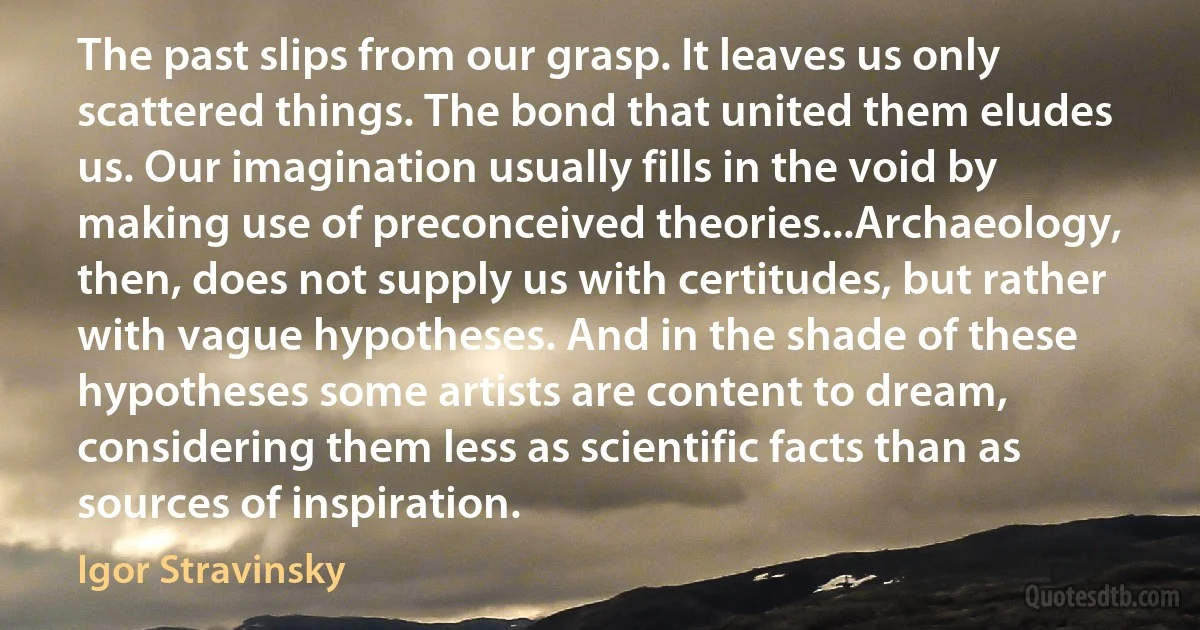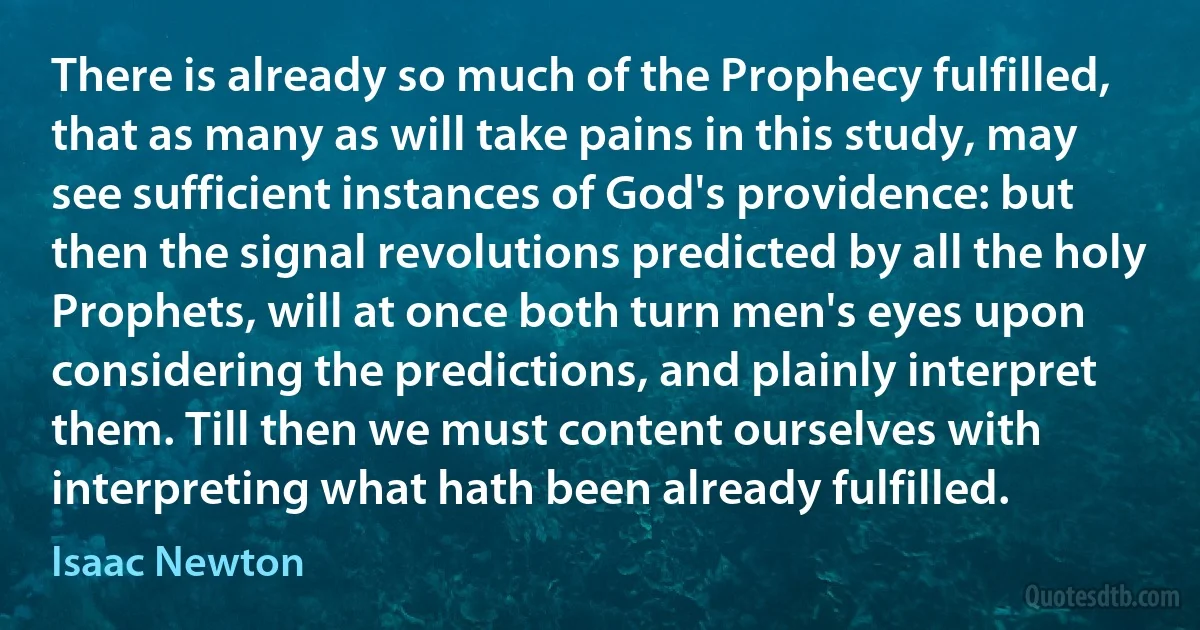Considering Quotes - page 16
Considering the optimistic turn taken by world trade AT THIS MOMENT...it is some consolation at least that the revolution has begun in Russia, for I regard the convocation of 'notables' to Petersburg as such a beginning. ... [O]n the Continent revolution is imminent and will, moreover, instantly assume a socialist character.

Karl Marx
The war continues. In considering the policy to be adopted for suppressing the insurrection I have been anxious and careful that the inevitable conflict for this purpose shall not degenerate into a violent and remorseless revolutionary struggle. I have therefore in every case thought it proper to keep the integrity of the Union prominent as the primary object of the contest on our pan.

Abraham Lincoln
Gluttony should be destroyed by self-control; unchastity by desire for God and longing for the blessings held in store; avarice by compassion for the poor; anger by goodwill and love for all men; worldly dejection by spiritual joy; listlessness by patience, perseverance and offering thanks to God; self-esteem by doing good in secret and by praying constantly with a contrite heart; and pride by not judging or despising anyone in the manner of the boastful Pharisee (cf. Lk. 18:11-12), and by considering oneself the least of all men.

John of Damascus
The greatest impression he made on me: whatever he said or did, happened – with greatest ease. One never had the impression of being in front of a person who was aware of his own significance or who acted upon it. There was never any trace of vanity, as with many when faced with the fate of considering oneself above average.

Richard Strauss
My purpose here is to denounce an idea which seems to be dangerous and false. ... Revolutionary trade unionists and orthodox communists are at one in considering everything that is purely theoretical as bourgeois. ... The culture of a socialist society would be a synthesis of theory and practice; but to synthesize is not the same as to confuse together; it is only contraries that can be synthesized. ... Marx's principal glory is to have rescued the study of societies not only from Utopianism but also and at the same time from empiricism. ... Humanity cannot progress by importing into theoretical study the processes of blind routine and haphazard experiment by which production has so long been dominated. ... The true relation between theory and application only appears when theoretical research has been purged of all empiricism.

Simone Weil
It is probable... that the greatest inventor in science was never able to do more than to accelerate the progress of discovery, and to anticipate what time, "the author of authors," would have gradually brought to light. Though logarithms had not been invented by Napier, they would have been discovered in the progress of the algebraic analysis, when the arithmetic of powers and exponents, both integral and fractional, came to be fully understood. The idea of considering all numbers, as powers of one given number, would then have readily occurred, and the doctrine of series would have greatly facilitated the calculations which it was necessary to undertake. Napier had none of these advantages, and they were all supplied by the resources of his own mind. Indeed, as there never was any invention for which the state of knowledge had less prepared the way, there never was any where more merit fell to the share of the inventor.

John Napier
Considering that blood is a priceless influencer of people's sympathies, riot reporting is a favourite hunting ground for aspiring moulders of public opinion. ... the English-language papers which determine the international impression of India's communal situation have specialized in the anti-Hindu variety, at least in the 1980s and early 90s.

Koenraad Elst
We came back to the chairs now and then and sang hesitant, clever, nervous, gentle dithyrambs about how we were beginning to feel towards one another. Actually we did not have the feelings we said we had until we spoke them - at least I didn't; to phrase them was to invent them and own them. We whipped our strangeness and newness into a froth that resembled love, and we dared not play too long with it, talk too much of it, or it would flatten and fizzle away. So we moved back and forth from chairs to water, from talk to silence, and considering my unshakable edginess with Brenda, and the high walls of ego that rose, buttresses and all, between her and her knowledge of herself, we managed pretty well.

Philip Roth
It is not then from the alienated affections of Ireland or America, that you [George III] can reasonably look for assistance; still less from the people of England, who are actually contending for their rights, and in this great question, are parties against you. You are not however, destitute of every appearance of support: you have all the Jacobites, Non-jurors, Roman Catholics, and Tories of this country, and all Scotland, without exception. Considering from what family you are descended, the choice of your friends has been singularly directed; and truly, Sir, if you had not lost the Whig interest of England, I should admire your dexterity in turning the hearts of your enemies.

Junius
That history should have weighed so heavily upon European affairs at the start of the twenty-first century was ironic, considering how lightly it lay upon the shoulders of contemporary Europeans. The problem was not so much education-the teaching or mis-teaching of history in schools, though in some parts of southeastern Europe this too was a source of concern-as the public uses to which the past was now put. In authoritarian societies, of course, this was an old story; but Europe, by its self-definition, was post-authoritarian. Governments no longer exercised a monopoly over knowledge and history could not readily be altered for political convenience.

Tony Judt
It is sometimes said that this is a pleasure-seeking age. Whether it be a pleasure-seeking age or not, I doubt whether it is a pleasure-finding age. We are supposed to have great advantages in many ways over our predecessors. There is, on the whole, less poverty and more wealth. There are supposed to be more opportunities for enjoyment: there are moving pictures, motor-cars, and many other things which are now considered means of enjoyment and which our ancestors did not possess, but I do not judge from what I read in the newspapers that there is more content. Indeed, we seem to be living in an age of discontent. It seems to be rather on the increase than otherwise and is a subject of general complaint. If so it is worth while considering what it is that makes people happy, what they can do to make themselves happy, and it is from that point of view that I wish to speak on recreation.

Edward Grey, 1st Viscount Grey of Fallodon



